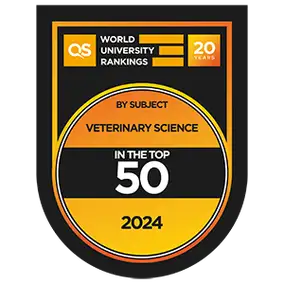Type of qualification
Level of study
Once you’ve graduated with a bachelor’s degree – or have equal experience – you can study at the postgraduate level. Doctoral qualifications require additional entry requirements.
Our courses follow the New Zealand Qualification Framework (NZQF) levels.
Time to complete
International students
International students are not New Zealand citizens or residents.
Study a Master of Veterinary Medicine – MVM
Massey’s Master of Veterinary Medicine qualification offers practising veterinarians a flexible, modular system of study via online learning. You may choose from a wide range of small animal, large animal, epidemiology and veterinary business courses, or put them together for a qualification.
You’ll be joining one of the few online distance education qualifications for veterinarians that offers the option of completing a qualification.
This qualification is not designed to retrain veterinarians wanting to return to practice. The courses assume a base level of knowledge of learnings in the veterinary degree, and aim to extend veterinarians to a higher level of knowledge and skill. All courses have some assessments that require reporting of clinical material you may have managed.
Improve skills and knowledge
The MVM provides a comprehensive understanding of day-to-day issues in veterinary practice, and will enhance your skills and knowledge as a general practitioner.
Flexible distance learning
Distance learning means you can study at your own pace, balancing work and personal commitments.
Applied learning and practical application
The MVM applies theoretical knowledge to real-life practice. You'll provide better care to clients and patients. We offer opportunities to keep up-to-date with current literature and engage in research.
Customisable curriculum
Choose from a variety of courses that align with your interests and your professional goals. This tailored learning experience ensures a well-rounded education and the opportunity to deepen your understanding in specific areas of veterinary medicine.
Networking and collaboration
The MVM fosters networking and collaboration among fellow veterinarians as you purse your master's degrees. This platform for knowledge exchange and shared experiences helps build professional relationships.
Prestigious faculty
We offer instruction from specialists in their respective fields, who are often authors of widely recognised veterinary textbooks. These esteemed professionals ensure a high-quality education and offer valuable insights.
Value for money and continuing professional development
Students find the MVM to be an excellent investment. The degree contributes to ongoing professional growth and allows veterinarians to keep up to date with the latest advancements in the field.
Research capstone course
The capstone course is and opportunity to develop your academic research and writing skills. Engaging in research contributes to the advancement of veterinary medicine and opens doors to further academic pursuits.
A MVM is a good fit if you:
- are already a qualified veterinarian
- would like the flexibility of studying via distance online learning
- would like to increase your in-depth knowledge of specifics of veterinary medicine.
Entry requirements
Admission to Massey
All students must meet university entrance requirements to be admitted to the University.
Specific requirements
To enter the Master of Veterinary Medicine you will have been awarded or qualified for:
- a Massey University Bachelor of Veterinary Science (BVSc), or
- have a veterinary qualification that can be registered by the New Zealand Veterinary Council or is considered by the Academic Board to be equivalent to the Massey University BVSc.
In order to enrol directly into the Master of Veterinary Medicine qualification you must have obtained a B grade average in your veterinary degree.
You will need to provide copies of all official academic transcripts for studies taken at all universities other than Massey University.
Entry is subject to final approval by the Director of the MVM.
English language requirements
To study this qualification you must meet Massey University's English language standards.
Time limits for Honours, Distinction and Merit
Where your qualification is completed within the stated time limit and to a high standard, you may be able to graduate Distinction or Merit.
- Look for information under ‘Student Progression’ in the General Regulations for Postgraduate Degrees, Postgraduate Diplomas and Postgraduate Certificates.
- Contact us through the Get advice button on this page if you have any questions.
Prior learning, credit and exemptions
For information on prior learning, exemptions and transfer of credit or other questions:
- review the Recognition of Prior Learning regulations
- contact us through the Get advice button on this page.
English language skills
If you need help with your English language skills before you start university, see our English for Academic Purposes (EAP) courses.
Maximum time limits for completion
There are maximum time limits to complete postgraduate qualifications. If you do not complete within the maximum time, you may be required to re-apply for the qualification if you wish to continue your studies.
Can't meet the entry requirements?
If you are not eligible to enrol directly into the Master of Veterinary Medicine, you may still be able to gain entry. An option is to complete at least two Master of Veterinary Medicine courses within another Massey qualification. You must also achieve a B grade in those courses.
Suitable qualifications are the:
- Certificate of Proficiency
- Postgraduate Certificate in Science and Technology (PGCertScTech), or
- Postgraduate Diploma in Veterinary Science (PGDipVSc).
Entry into these qualifications is dependent on your meeting those qualifications’ entry requirements.
If you successfully complete the MVM courses under one of these other qualifications, you may able to transfer your enrolment to the Master of Veterinary Medicine.
Official regulations
To understand what you need to study and must complete to graduate read the official rules and regulations for this qualification.
You should read these together with all other relevant Statutes and Regulations of the University including the General Regulations for Postgraduate Degrees, Postgraduate Diplomas, and Postgraduate Certificates.
Returning students
For returning students, there may be changes to the majors and minors available and the courses you need to take. Go to the section called ‘Transitional Provisions’ in the Regulations to find out more.
In some cases the qualification or specialisation you enrolled in may no longer be taking new enrolments, so may not appear on these web pages. To find information on the regulations for these qualifications go to the Massey University Calendar.
Please contact us through the Get advice button on this page if you have any questions.
Structure of the Master of Veterinary Medicine
The Master of Veterinary Medicine is awarded without a subject.
| Courses offered in odd years | |
|---|---|
| February | July |
| 118777 Veterinary Clinical Reproduction and Fertility | 118759 Ophthalmology in Small Animal Practice |
| 118762 Dermatology for Small Animal Veterinarians | 118763 Canine and Feline Orthopedic Surgery |
| 118761 Canine and Feline Emergency Medicine | 118756 Canine and Feline Neurology |
| 118752 Canine and Feline Endocrinology | 118776 Lameness Investigation and Control for Cattle Veterinarians |
| 118771 Advances in Ruminant Nutrition for Veterinarians | 118786 Applied Veterinary Epidemiology |
| 118785 Introduction to Evidence Based Practice | |
| Courses offered in even years | |
|---|---|
| February | July |
| 118758 Avian Medicine | 118757 Cardiorespiratory Medicine for Small Animal Veterinarians |
| 118753 Canine and Feline Oncology | 118755 Clinical Pathology in Small Animal Practice |
| 118764 Canine and Feline Soft Tissue Surgery | 118754 Diagnostic Imaging for Small Animal Veterinarians |
| 118775 Advanced Mastitis Management for the Production Animal Veterinarian | 118751 Canine and Feline Gastroenterology |
| 118785 Introduction to Evidence Based Practice | 118772 Calf Medicine, Health and Management |
| 118786 Applied Veterinary Epidemiology | |
Duration of courses
The duration of most courses is 24 teaching weeks over two semesters (seven to eight months total):
- Semesters One and Two (late February to early November), or
- Semester Two and summer school (mid-July to mid-February).
Exceptions are the epidemiology courses, 118785 and 118786, which are single semester (either February–June or July–November).
Time commitment
Each course offered over two semesters involves about five to six hours of work per week – one-eighth of a full-time workload. You need to allow about 150 hours for each 15-credit course.
When are courses offered?
Most courses in the Master of Veterinary Medicine (MVM) qualification are offered once every second year.
These courses are offered every year:
- the capstone courses (118851, 118852, 118853)
- 118761 Canine and Feline Emergency Medicine
- 118785 Introduction to Evidence Based Practice.
Research reports
There are three ways to complete the final 45 or 60-credit research reports (118851,118852, 118853), which are called capstone courses. Two of these are research reports (45 and 60 credits) (118851, 118852). The third capstone option for the MVM is a 45-credit practicum course (118853). You will spend three months full-time under supervision with an expert in any discipline of veterinary science.
Location
All courses in the Master of Veterinary Medicine qualification are delivered by distance learning. Contact workshops are held in Palmerston North, New Zealand. Attendance at these is strongly recommended but not compulsory (except for capstone courses 118851, 118852 and 118853).
Other qualifications
The Master of Veterinary Medicine (MVM) is the highest-level qualification. Other qualifications you can study towards include the Postgraduate Diploma in Veterinary Science (PGDipVSc) (120 credits) and the Postgraduate Certificate of Science and Technology (PGCertScTech) (60 credits).
Courses and specialisations
Key terms
- Courses
- Each qualification has its own specific set of courses. Some universities call these papers. You enrol in courses after you get accepted into Massey.
- Course code
- Each course is numbered using 6 digits. The fourth number shows the level of the course. For example, in course 219206, the fourth number is a 2, so it is a 200-level course (usually studied in the second year of full-time study).
- Credits
- Each course is worth a number of credits. You combine courses (credits) to meet the total number of credits needed for your qualification.
- Specialisations
- Some qualifications let you choose what subject you'd like to specialise in. Your major or endorsement is what you will take the majority of your courses in.
Credit summary
120 credits
- Schedule A or Schedule A and B courses – 60-75 credits
- Schedule C research report or professional practice report – 45‑60 credits
Course planning key
- Prerequisites
- Courses that need to be completed before moving onto a course at the next level. For example, a lot of 200-level courses have 100-level prerequisite courses.
- Corequisites
- Courses that must be completed at the same time as another course are known as corequisite courses.
- Restrictions
- Some courses are restricted against each other because their content is similar. This means you can only choose one of the offered courses to study and credit to your qualification.
Schedule A: Subjects
Some qualifications let you choose what subject you'd like to specialise in. Your major or endorsement is what you will take the majority of your courses in.
You may enrol in this qualification for the Without Specialisation option.
Companion Animal
Massey's Master of Veterinary Medicine (Companion Animal) is a world-leading online education qualification, attracting students from all around the globe.
Without Specialisation
Join Massey’s Master of Veterinary Medicine, a world-leading online education qualification that attracts students from all around the globe.
Schedule B: Elective courses
Course code: 118785 Introduction to Evidence-Based Practice 15 credits
Students will study the principles of veterinary epidemiology to provide them with the skills necessary to critically evaluate the literature for the purposes of evidence-based medicine. Examples and case studies will be drawn from a range of species including production animals, wildlife, companion animals and horses.
View full course detailsCourse code: 118786 Applied Veterinary Epidemiology 15 credits
Students will gain the skills necessary to design an epidemiological study in a clinical setting and investigate an outbreak of disease. Examples and case studies will be drawn from a range of species including production animals, wildlife, aquatic species, companion animals and horses.
View full course detailsSchedule C: Research courses
Course code: 118851 Research Report (MVM) (45 credit) 45 credits
A detailed examination of a specific topic within the field of study of the candidate, approved by the course co-ordinator in advance, which may include aspects of original research, problem investigation, and/or study of pre-existing data or published literature.
View full course detailsCourse code: 118852 Research Report (MVM) (60 credit) 60 credits
A detailed examination of a specific topic within the field of study of the candidate, approved by the course co-ordinator in advance, which may include aspects of original research, problem investigation, and/or study of pre-existing data or published literature.
View full course detailsCourse code: 118853 Advanced Profession Practice in Veterinary Science 45 credits
A supervised placement in an approved setting of veterinary practice. Students will observe the work of experts in the selected area of veterinary practice, undertake some work under supervision, and gain experience in using the empirical literature to guide evidence-based decision making and writing reports in the discipline.
View full course detailsFees and scholarships
Fees, student loans and free fees scheme
Your tuition fees may be different depending on the courses you choose. Your exact fees will show once you have chosen your courses.
There will also be some compulsory non-tuition fees and for some courses, there may also be charges for things such as study resources, software, trips and contact workshops.
- Get an estimate of the tuition fees for your qualification
- View a list of non-tuition fees that may be payable
Already know which courses you're going to choose?
You can view fees for the courses that make up your qualification on the course details pages.
Student loans (StudyLink) and Fees Free scheme
You may be eligible for a student loan to help towards paying your fees.
The New Zealand Government offers fees-free tertiary study for eligible domestic students. Find out more about the scheme and your eligibility on the Fees Free website. To use the site's eligibility checking tool, you will need your National Student Number.
Current and returning Massey students can find their National Student Number in the student portal.
- Student loans (StudyLink)
- Fees Free
- Student portal
Scholarship and award opportunities
Find more scholarships and awardsFees disclaimer
This information is for estimation purposes only. Actual fees payable will be finalised on confirmation of enrolment. Unless otherwise stated, all fees shown are quoted in New Zealand dollars and include Goods and Services Tax, if any. Before relying on any information on these pages you should also read the University's Disclaimer Notice.
Careers and job opportunities
Graduates of the Master of Veterinary Medicine qualification often become the go-to people in clinical practice to discuss cases. They are confident in communicating with clients and have excellent writing skills. You will develop your critical thinking skills, which are transferrable to many situations in the veterinary profession.
Career prospects for MVM graduates
When you graduate from this qualification, you could go on to:
- academic research
- animal feed companies
- governmental agencies
- the pharmaceutical industry
- veterinary administration
- veterinary journalism
- the veterinary medical industry
- veterinary practice.
Skills gained through a master’s qualification
A person with a master’s degree is able to:
- show evidence of advanced knowledge about a specialist field of enquiry or professional practice
- demonstrate expertise in sophisticated theoretical subject matter
- evaluate critically the findings and discussions in literature
- research, analyse and argue from evidence
- work independently and apply knowledge to new situations
- engage in rigorous intellectual analysis, criticism and problem solving.
What our students say
“The MVM has taught me how to be critical of scientific literature - something I was not expecting from the course. I believe this is a really important skill set to have in our ever-evolving veterinary profession.”

“The MVM team is highly supportive, friendly and professional and are eager to help you succeed at every stage.”

Accreditations and rankings

QS Ranking - Veterinary Science
The Veterinary School is ranked by QS (Quacquarelli Symonds) as 21st in the world for veterinary science, the highest ranked school in the southern hemisphere.
Useful planning information

Key information for students
Compare qualifications and academic information across different New Zealand institutions. Learn more on careers.govt.nz

